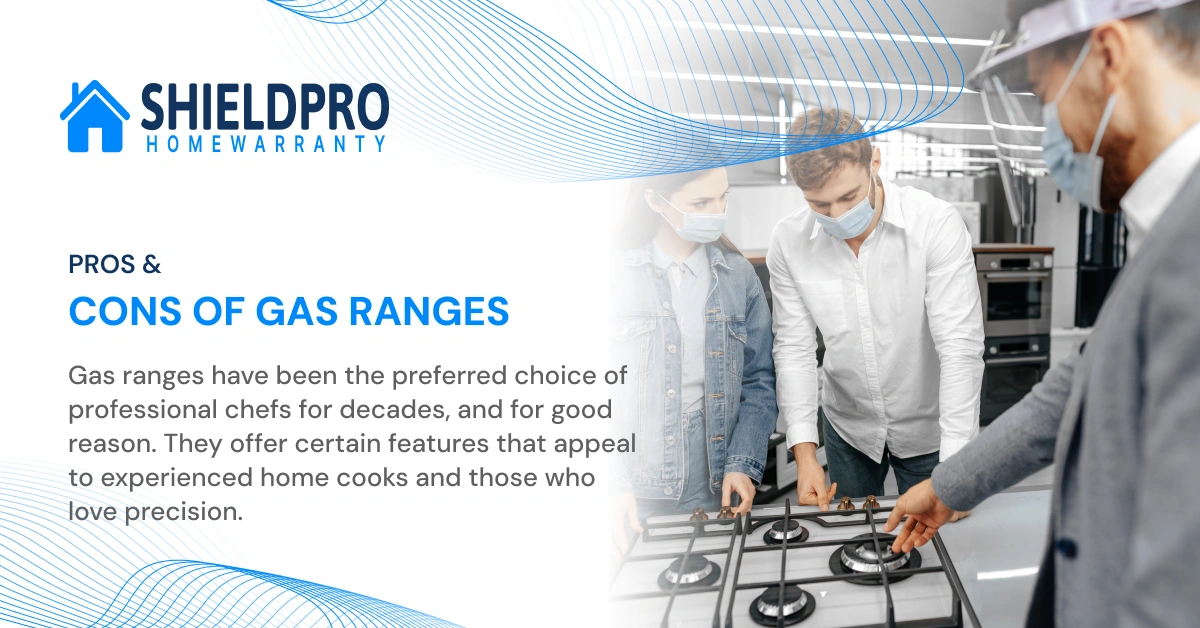
When it comes to upgrading your kitchen appliances, choosing between a gas and an electric range can be a challenging decision. Both have their advantages and drawbacks, and ultimately, the best option depends on your cooking style, budget, and energy preferences. In this comprehensive guide, we’ll break down the key differences, pros, and cons of gas and electric ranges to help you make an informed choice for your kitchen.
Pros & Cons of Gas Ranges
Gas ranges have been the preferred choice of professional chefs for decades, and for good reason. They offer certain features that appeal to experienced home cooks and those who love precision.
Pros of Gas Ranges:
- Instant Heat and Temperature Control: Gas ranges provide instant heat, allowing you to start cooking right away. This is particularly useful for recipes that require precise temperature control, like sautéing or boiling.
- Better for Heavy Cooking: Whether you’re simmering a sauce for hours or grilling steaks, gas provides a high level of heat that’s ideal for intense cooking.
- Cost-Effective in the Long Run: While gas ranges tend to be more expensive upfront, the ongoing operating costs can be lower. Natural gas is typically cheaper than electricity, especially for households that cook frequently.
- Works During Power Outages: Gas stoves don’t rely on electricity, so you can continue cooking during power outages—a handy feature in areas prone to weather disruptions.
Cons of Gas Ranges:
- Higher Installation Costs: If your home isn’t already equipped with a gas line, the installation can be costly and complex. Gas ranges require professional installation to ensure safety and proper ventilation.
- Maintenance Needs: Gas ranges require regular maintenance, including checking for gas leaks and cleaning the burners, which can accumulate grease and debris over time.
- Safety Concerns: Gas ranges come with a slight risk of gas leaks, which can lead to dangerous situations if not properly maintained.
Pros & Cons of Electric Ranges
Electric ranges have become more popular in recent years, especially with the development of sleek designs and advanced technologies. These ranges offer consistent cooking performance and are easier to maintain.
Pros of Electric Ranges:
- Even Heat Distribution: Electric ranges are known for their even heat distribution. This makes them ideal for baking, where consistent temperature control is critical. Cakes, pastries, and breads often turn out better in an electric oven.
- Easier to Install: If your kitchen is already wired for electricity, an electric range is easy to install. There’s no need to worry about gas lines or additional plumbing.
- Lower Maintenance: Electric ranges are generally easier to clean and maintain. There are fewer parts to worry about (like gas burners), and the smooth glass top surfaces make cleaning a breeze.
- Safer Than Gas: Electric ranges don’t pose the same risk of gas leaks as gas stoves. They are generally considered safer, especially in households with children.
Cons of Electric Ranges:
- Slower Heating Times: Unlike gas, which heats up instantly, electric ranges take longer to heat up and cool down. This can be frustrating for home cooks who value speed.
- Higher Operating Costs: Electricity tends to be more expensive than gas, so using an electric range for daily cooking can add up over time. The cost-effectiveness of electric ranges depends on your local energy prices.
- Dependence on Electricity: If there’s a power outage, you’ll be unable to cook. This can be a major drawback in areas where power cuts are frequent.
Gas vs Electric: Which Is More Energy Efficient?
When it comes to energy efficiency, gas ranges have a slight edge. Gas stoves use natural gas directly for combustion, making them more energy-efficient in terms of heat output. On the other hand, electric ranges convert electrical energy into heat, but much of this energy is lost in the process.
Energy Efficiency Breakdown:
- Gas Range: On average, gas stoves are about 10-15% more efficient than electric ranges due to the direct use of natural gas.
- Electric Range: Electric ranges are about 5-10% less efficient but still perform well for most household needs. Induction stoves, a specific type of electric range, are even more efficient than gas and traditional electric stoves, but they come with a higher price tag.
If you’re looking for cost savings over the long term, gas could be your best option. However, if you prioritize safety and consistency in your cooking performance, an electric range might be the better fit.
Cost Comparison: Gas vs Electric Range
The initial purchase price for both gas and electric ranges is relatively similar, but the installation and operating costs vary significantly.
- Gas Range Installation: Typically requires a gas line to be installed, which can be expensive if your home isn’t already set up for it. Installation can cost anywhere from $200 to $1,000 depending on your location and the complexity of the installation.
- Electric Range Installation: Generally cheaper to install, especially if your kitchen is already wired for electricity. Expect installation costs to range from $100 to $400.
Operating Costs:
- Gas: On average, gas is cheaper than electricity, meaning your monthly utility bills for gas ranges will likely be lower.
- Electric: With electricity being more expensive than gas, the monthly cost of operating an electric range could be higher in areas with high energy rates.
Gas vs Electric Ranges: Which Is Better for Baking and Cooking?
If you’re a frequent baker, an electric range might be your best choice. The even heat distribution of electric ovens ensures that cakes and pastries bake more consistently. Gas ovens, on the other hand, tend to have hot spots and uneven heat, which can affect the final product, particularly for delicate baking.
However, if you do a lot of stir-frying, grilling, or quick sautéing, a gas range will give you more control over the heat, allowing for faster cooking times and precise adjustments.
Gas vs Electric Range Safety: Which Is Safer?
Electric ranges are generally considered safer than gas ranges, primarily because there is no risk of a gas leak. With electric ranges, once the appliance is turned off, there is no risk of residual heat or gases being emitted.
Gas ranges, while generally safe, pose a risk of gas leaks. In homes with older or poorly maintained appliances, this could lead to dangerous situations. Regular inspections and proper maintenance can mitigate these risks.
How to Choose Between Gas and Electric Ranges
Choosing between a gas and electric range ultimately depends on your cooking preferences and budget. Here are a few factors to consider:
- Cooking Style: If you prefer fast cooking and precise heat control, a gas range may be the best choice.
- Budget: Gas ranges can have lower ongoing operating costs, but the installation is more expensive.
- Safety: If safety is a priority, an electric range is safer since it doesn’t involve gas leaks.
- Installation: If you’re doing a kitchen renovation and gas lines are already in place, a gas range is a great option. If you’re looking for something simpler, an electric range may be easier to install.
Final Verdict: Gas or Electric Range?
Both gas and electric ranges have their strengths, and the best choice depends on your specific needs. Gas ranges offer precision and cost-effectiveness, making them ideal for heavy cooking and those who love a hands-on approach. Electric ranges, on the other hand, are safer, easier to install, and offer even heat distribution, making them a top choice for bakers and those who prioritize consistency.
In the end, whether you choose gas or electric comes down to personal preference and your cooking habits. Consider your kitchen space, your energy consumption, and your budget before making your decision.
Conclusion
Choosing between a gas and electric range is a big decision for any home cook. By carefully weighing the pros and cons of each, you can make an informed choice that aligns with your cooking style, budget, and energy needs. Whether you go with the instant heat of gas or the consistent performance of electric, you’ll find that both types of ranges have something to offer.





